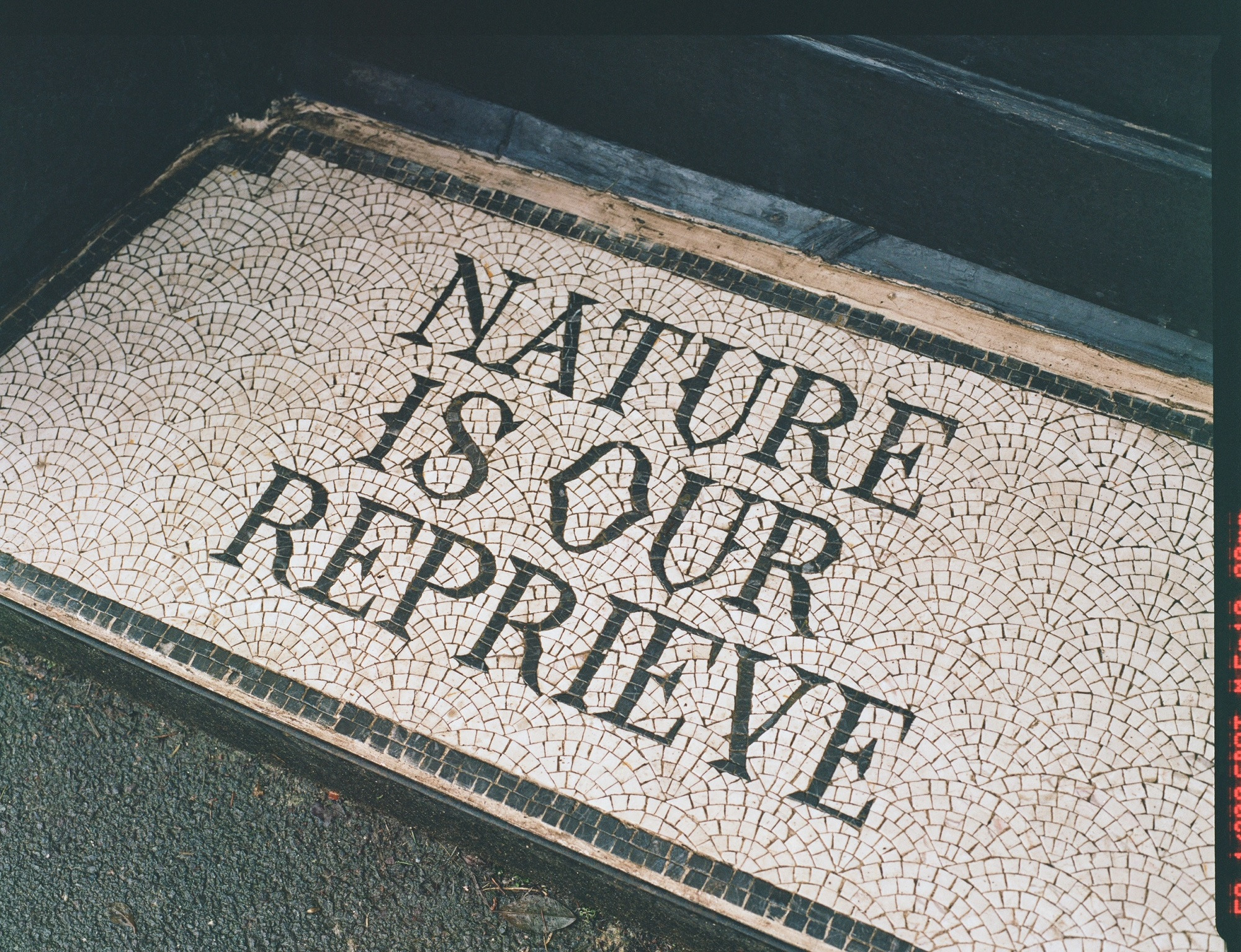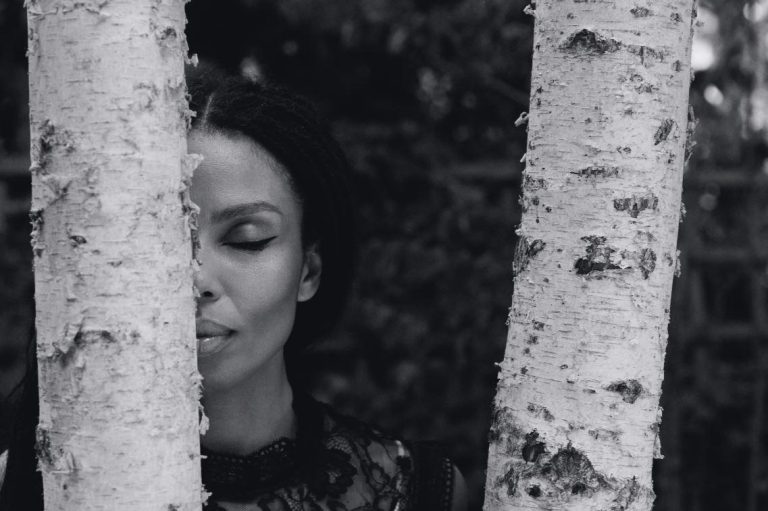
This is a Rebel Song
Published: 2024/02/05
Updated: 2024/02/15
FARIHA RÓISĺN: Disobedient Bodies resonated on so many different levels. I enjoyed it so much. It resonated with what I'm dealing with in my own body – being many different things in many different ways, existing within this strange permutation. I felt that in your book – this beautiful pastiche of many different things, and this allowance for all these ideas to come into play. The way in which you wove in this very important discussion about beauty and bodies, covering thinness and ‘pretty privilege’.
Reading your book was the reflection that I needed. It was such a beautiful kind of sigh of relief that I'm not alone.
EMMA DABIRI: My goodness. So profoundly moved to hear that. So glad it was helpful in that way. You're the second person I've spoken to who's read the book, so it's all super new to me in terms of people's responses. I was writing it down to the wire. I read an essay that you'd written, and you were talking about growing up in Australia and the specificity of the beauty standard there.
It was very, very similar to Ireland, apart from, it wasn't warm, so there wasn't so much bikini pressure. [There was] a very similar template for beauty — which was actually oppressive for everybody – but particularly so if you were a Black or Brown person. Ireland has changed for people who are maybe in their twenties and Black and Brown and Irish. There's [now] a community of people, but I'm in my 40s and when I was growing up, I knew if I saw another Black person, that was an event. I don't think I met a South Asian person until I was probably 14. Somebody who was mixed. His dad was South Asian and his mom was Irish. And then I don't think I met an Indian person. My mom had an Indian friend from England. He came to visit, and that was probably when I was 16. But equally, I was the first Black person that many people had ever seen in their life. I know that because they would come and touch me and tell me. So it was an intense environment to grow up in.
I appreciated the way you acknowledged wanting the desire of men. I think we don't talk about that. It’s [viewed as] so uncouth. I actually really appreciated it.
I wanted to encourage people to embrace being desirable to whoever you're into. Enjoying that.
I'd love to know a little bit more about your childhood. You didn't really talk about it in this book. What's your story?
Yeah, I don't really go into it in this book. I go into it in my first book, which is called Don't Touch My Hair, but basically my mother is White and Irish, and my dad is Nigerian. My Nigerian grandfather went to university in Ireland in the 1940s, which was really unusual. He went back to Nigeria – but because there was this relationship with Ireland, my dad then went and studied there too, and he met my mom, they got married and I was born. But immediately after I was born, we moved to Atlanta. So I spent the first five years of my life in Atlanta with Nigerian extended family in an entirely Black environment, in an entirely Black society, with the exception of my mom, who's White and Irish. When I was five, we moved back to Ireland.
The shock of going from somewhere that was entirely Black to somewhere that was entirely White and hostile was…I remember that period of my childhood so vividly. I have vivid memories, I think probably more than is typical for that age, because the contrast between the two was so incredibly stark. From the moment I moved back to Ireland, I experienced very explicit racism. Not microaggressions – outspoken and explicit racism. However, I feel that those early years of being somewhere where I was ordinary gave me something of a fortitude. I knew that what I was experiencing in Ireland wasn't the entirety of reality in a way that I don't think I would've known so innately if I hadn't had those early years in Atlanta. That gave me a certain fortitude that helped me deal with what I was experiencing.
But in terms of the kind of scholarship in the book and the research into Yoruba and African philosophies…I'm an avid reader, and from a very young age, I started to read Black history. To begin with [it was] Black American history, slave narratives. I think I was looking for answers as to why I was experiencing what I was experiencing. I was also searching. I read a lot of fiction by Black writers. I think I was looking for the community in literature that I didn't have in reality.
As soon as I finished school, I wanted to leave and go somewhere where I'm not so overtly determined by my race. Somewhere there is more diversity so I'm more ordinary, certainly where there's more Black people. Because I was so interested in African history, when I finished school, I moved to London and came to SOAS, the School of Oriental and African Studies at the University of London and studied African history and African studies. Then I did a Master's, and I started teaching at SOAS. I became a teaching fellow and taught there for 10 years. I taught African studies.
My first book Don't Touch My Hair is a history of black hairstyling culture and is very specifically Africa and African diasporas oriented. With this book, I was keen to centralise non-Western and non-hegemonic metaphysics and philosophies. But I also wanted to expand beyond only looking at Africa. I've become increasingly interested in my Irishness, which is something that, because my Irishness was always so contested and I was so consistently told that I wasn't Irish, I was largely disinterested in. I was just like, ‘fine, okay, there's no connection’. But then moving to the UK was a huge culture shock because I discovered that there were many things about me that I thought were just normal things that I realised were specifically very culturally Irish things. And I was like, ‘oh, shit. I am actually Irish.’
So, in this book, I'm really interested in the Irish language. I've been trying to learn it again, [because there’s] great decolonial possibilities within that. And I wanted to explore notions of the body and beauty and just ideas that existed in Ireland, not just pre-colonisation – because Ireland was colonised for like 800 years – but philosophies of pre-Christian Ireland. So, there's a bit of that in the book. Then I wanted to also draw on other parts of knowledge from other parts of the world that I don't necessarily have any ancestry in, but are just interesting to me, and I think we can learn from. I lived in Japan for a few years, [so] I included some of the ideas I was exposed to from living there.
I have a friend who's a professor of indigenous studies at Princeton. I was talking to him about some of these ideas, and he was telling me that there are parallels in different Native American cultures. The ideas from the Navajo seemed to have a lot of sympathy and parallels with Yoruba notions of beauty as well. I'd like to have gone into even more cultures, but it's a short book, so there was only so much I could include. I also don't like to stray too far into stuff that I really don't know anything about. I like to have some level of previous knowledge.
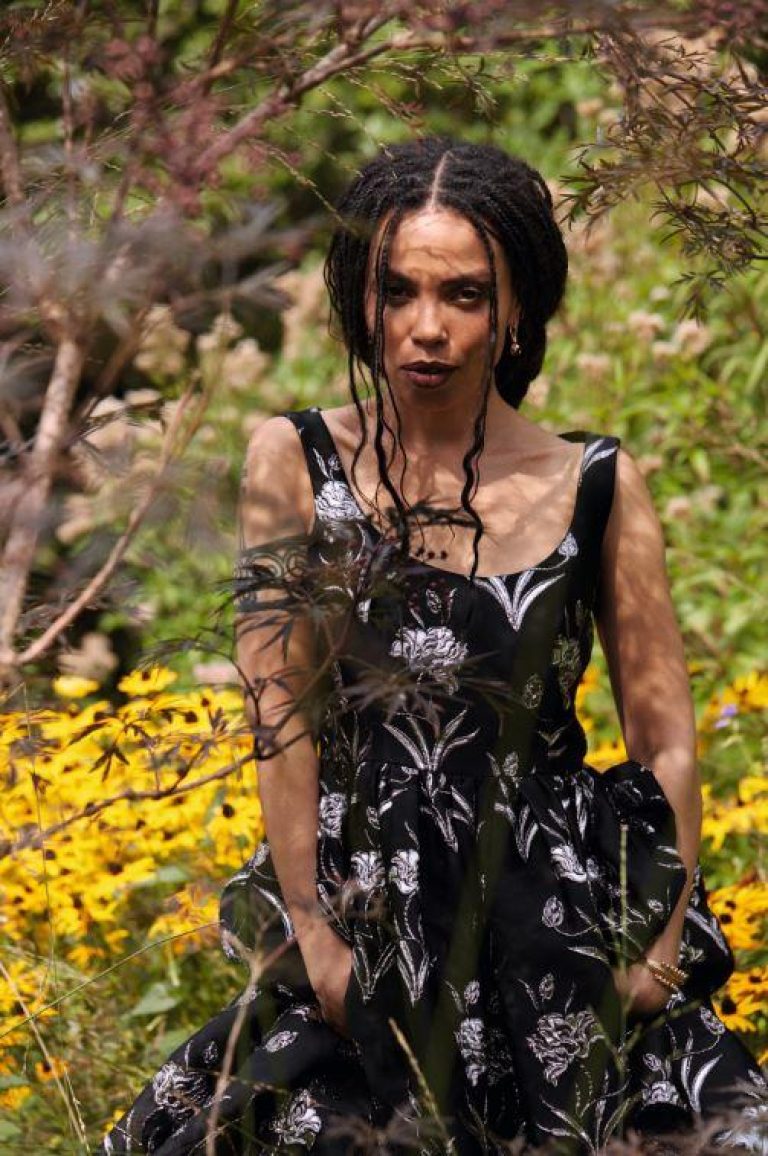
Dress ERDEM, earrings and cuff CARTIER.
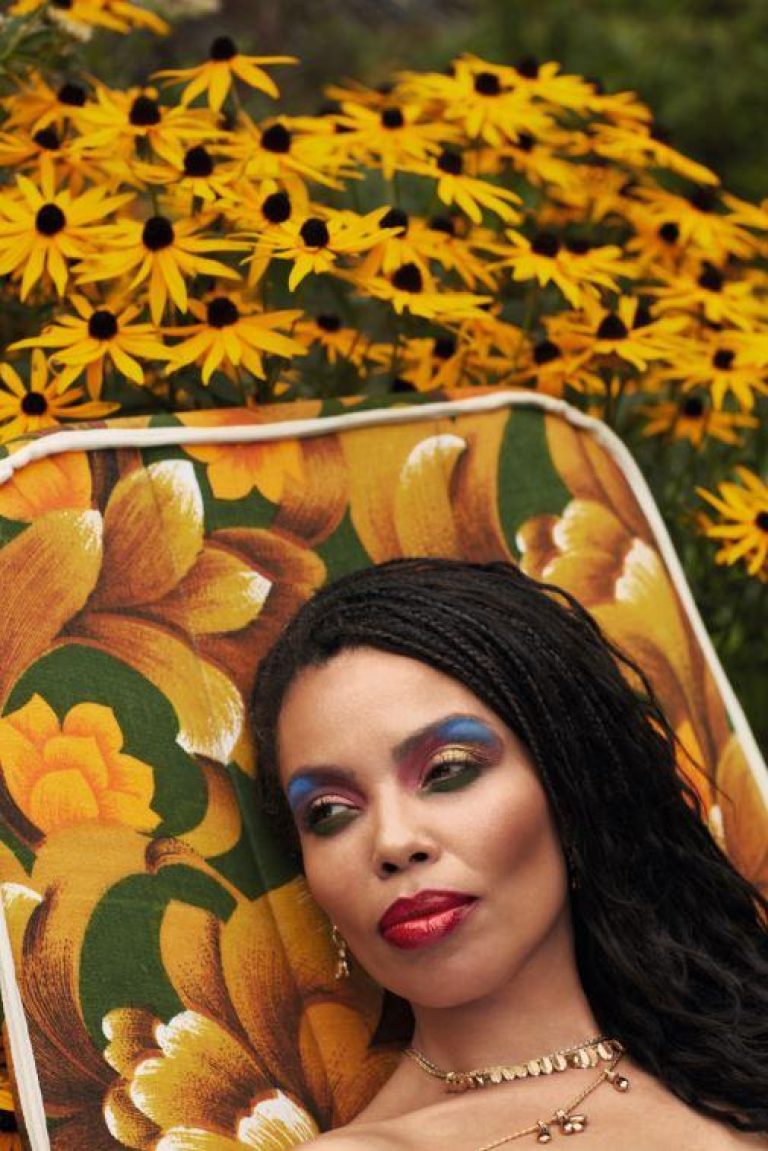
All Jewellery CARTIER.
It was so fun to read, which was surprising because it's dense. You're still being forced to face and confront yourself, and that I think is such an interesting action, but such an uncomfortable action, nonetheless. I feel like Atlanta is a Black city, completely. And then as you described, to go to Ireland, to have that shock. I'm wondering if that is what radicalised you? Because there's a radical spirit through you and through your work. Where does that come from?
I think that pronounced shock of early childhood; it partially has its roots in that. I feel like I also became politicised quite early from the nature of the material I started engaging with from a young age. But also, I did some digging around about my family. I knew that my Nigerian granddad was a high court judge in Nigeria, but he'd already passed away by the time I discovered that. I found out that he'd done things like supported Nigerian miners. There was a court case between the British colonial government and these miners, and he'd taken the miners case on in a pro bono capacity. I found that he'd actually been quite radical as well, but I hadn't known that when he was alive. I'd never gotten to discuss any of it with him. But when I learned that I was like, ‘oh, I wonder if this has its antecedent in something intergenerational.’
My dad was a complicated person. He's also passed away, but he was also pretty radical in his politics. I grew up in a house that had books like Walter Rodney's [1972 essay] How Europe Underdeveloped Africa that were just on my bookshelf. I wasn't necessarily reading it, but I was seeing that spine. So I was having those ideas introduced to me from a young age. I went back to Ireland recently, and I was at my mom's house. I found this random box of books and there was a book on Black power that my dad bought in Atlanta in the 70s for 79 cents.
There were Irish radicals and stuff that were my granddad's books from the 60s, and I was just like, oh, wow, this is because my family's very dysfunctional and I was quite disconnected physically and geographically disconnected. Apart from those early years, we went our separate ways. So, this wasn't something that was necessarily communicated to me as I was growing up. But as I've done a little bit more digging, I see that there's a context maybe that emerges. I have to add [the influence of] Irish folk music as well. There are different traditions of it, but there's one that is so fiercely anti-imperialist. For some reason, when we were living in Atlanta, my mom taught me all of these folk songs. They're so anti-imperialist and fiercely anti colonial, and they're the first words I ever memorised. So, I think the combination of those two influences set me up, and that combined with the very explicit and direct experiences of racism that I was having.
It's kind of wild, the parallels between our lives. My grandfather, my mother's father, was a socialist member of parliament, who was also a barrister in the socialist party in Pakistan and then in Bangladesh, in India, Pakistan, and Bangladesh, I think because through the course of his life there was partition and then there was the Liberation War. My father was a Marxist. I was raised with all of these ideologies, and actually, I don't know if they are fully serving me anymore. I've had to do a lot of healing around them as well, because I think that for me personally, having generations of socialist Marxists in my family, I think three or four generations, has meant that my ancestral relationship with money is very fraught.
Because I like beauty and nice things, and I want to be surrounded by beauty, I've struggled with knowing how to be in integrity and remain principled and how to enjoy fashion, things that are seen as more aesthetic and therefore surface.
I wanted to also understand and ask how you navigate that in your life. I think you do it so beautifully. What's it like for you having these values, talking about these values, writing about these values and I don't want to say participating in capitalism, we all are to a certain degree. How do you engage with that kind of dissonance in a way?
That's such a great question. Thank you. The analysis of capitalism underpins all of my work. I don't mean capitalism just as an economic system because capitalism is obviously so much more than just an economic system. It determines the nature of all our social relations. All our social relations are informed by the logic of individualism and competition, specifically in regard to beauty. They really fuel and charge that sense of comparison and judgement and envy. I think our beauty culture really reflects the distorted social relations that exist under capitalism. One of the reasons I want to try and challenge capitalism or expose it or engage with it, at least in my writing, is because one of the things I deeply resent about it is the fact that it compels us all to be complicit in it.
We can't live in this world and not be complicit in it. I'm not saying that as a get-out-of-jail card – I still think we can try and understand its machinations. I think it does a really good job of colonising our imaginations and our sense of how our relationships, to others human and non-human are. I really feel like I want to raise consciousness about those things. At the same time, I like nice things. I like beautiful things. So in the book, I wanted to engage. I think that's why I have sections on [Victorian-era British textile designer, poet, artist, and socialist activist] William Morris.
I wanted to think about aesthetic socialism. William Morris was interesting to me because his designs are incredibly beautiful. He was a very pronounced, active socialist, designer. Very influential in British design. He massively railed against the exploitation and the ugliness of Victorian mass-produced consumer culture. He started a design studio. There are contradictions–his stuff was really expensive because it was very carefully handcrafted. But I think his aim was to be able to make this stuff on a wider scale that was more accessible to more people. His vision, and this is also mine, was that luxury is not designer brands. Luxury to me is materials and textiles that are essentially natural textiles.
Capitalism requires inequality and exploitation to function. That's just baked into the DNA of it. If we had a different economic system that didn't prioritise infinite growth and profit and the hoarding of wealth for a tiny predatory elite, there are enough resources in the world for everybody to actually live lives of purpose and beauty, and we could all have access to it. Even the fact of ‘organic’ food. I mean, it should just be food. Our food is so poisoned and unhealthy because of the economic system that we live under. If that was transformed, we'd all have access to what my definition of luxury is, which is materials and textiles that are organic, that are healthy, things that are designed and created in sync with the specificity of the environment that we're in.
Another thing I find monstrous about capitalism is the homogenous nature of it. The fact that it creates this global system that everybody has to participate in. I don't believe that there's a one-size-fits-all way of living. There should be a way of life that is allowed to exist that is in sync and makes sense in its environment. We live these lives that are so disconnected from purpose, because our purpose is essentially just to serve global capital. We've lost a sense of what really is beautiful, and we are susceptible and vulnerable to what we are told is beautiful in ways that again, just serves capital. Does that make sense?
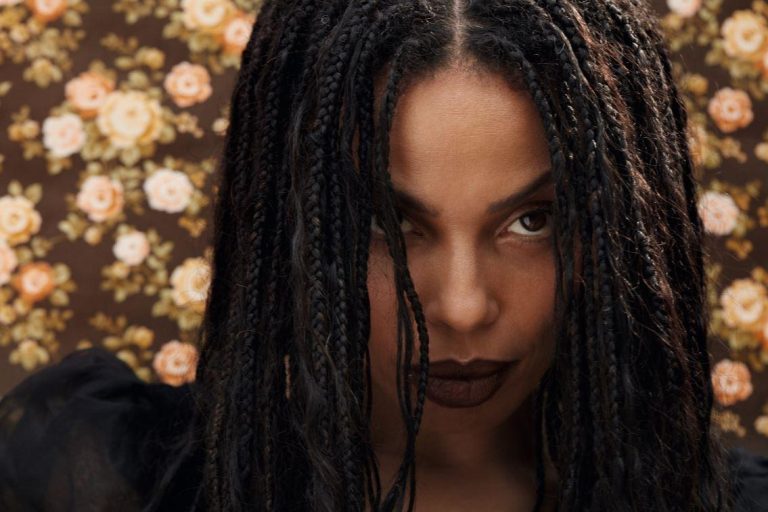
Dress THE VAMPIRE'S WIFE.
Everything made sense. These are my own negotiations that I'm having all the time, so it's really nice to talk to somebody else about it. How do you deal with it in your own life?
I experience a lot of online hate. I mean, not a lot, but I get my fair share of stuff. I think this comes back to your book too – women and the ways in which we are all bound by our own projections and judgments. So much of this comes from a place of insecurity that's only sustained by capitalism and sustained by this idea of, ‘women should hate other women’. I've had a lot of falling outs in my mid-20s into my now mid-30s. It's been weird, and I've often wondered if it's a pattern of harm that's being replicated.
My relationship with my mother, for example, [who is] an abuser and a survivor victim, whatever harm that was replicated there then is a pattern that I keep replicating in my relationship. Of putting people on a pedestal then being in servitude to them, then that kind of twists – because I'm also read as successful or powerful, strong or beautiful and all of these things.
I feel I’ve experienced a lot of betrayal, with people maybe not accepting me as a total person, as a whole person, with many different elements and many different stories and lives and context to who I am.
I get a lot of communist and socialist people who are very principled with a certain kind of Marxist lens, come for me and come for certain actions, if I work for brands. Last year I did this ad for [luxury cashmere brand] Loro Piana. I hadn’t worked with brands in maybe a year and a half, but I was like, ‘this is a lot of money. I'm going to fucking take it.’ I was very transparent, and it was weeks of just shit. I still don't really know how to navigate it. I'm curious how you interpersonally navigate it if you'd like to share, and what you do with that judgement if it comes to you.
I’m assuming a lot of this is happening on social media.
None of it's in real life.
Exactly. So again, I don't have too much of it in this book, but my second book, What White People Can Do Next: From Allyship to Coalition, really focuses on social media, types of anti-racism and their limitations and also social media and social justice. I talk a lot about the contradictions of it, whereby people's outrage, self-righteousness, and morality and their calling out of other people is actually often fuelled by a seeking of engagement and clout, basically. I just can't really engage with the dynamics of those platforms. I barely use Twitter because to me, Twitter is the most pronounced kind of example of the type of dynamics you're talking about.
I am pretty active on Instagram. I'm not saying that people don't come for me, but I feel like if they do, I write a lot about those dynamics. And if they were to, they'd be doing it within a framework that I've robustly critiqued. So, I don't know. For all that I love about social media – because there are a lot of things, I find really helpful and beneficial – I think the way it incentivizes outrage is something I can't really engage with too deeply. This is not a very good answer.
No, it's helpful to hear. I think that's the only way. Maybe just don't engage. I don't know if it ever will get easier. I think one day I just have to stop caring.
I actually feel like there was a period where it was really peak, but I feel there are so many people critiquing its processes and critiquing these dynamics now. There's a really amazing book by the Nigerian American philosopher Olúfẹ́miO. Táíwò called Elite Capture: How the Powerful Took Over Identity Politics (And Everything Else), which engages with a lot of these dynamics in a way that's really helpful. There's a lot of discourse around what you’re describing and how the motivations behind the people who are attacking you are maybe not as noble as they might profess. They're more often motivated, I think, by self-interest and self-aggrandizement than really wanting to make the world a fairer place.
Exactly. Thank you for that. That was the validation I needed.
I wanted to quote something. I guess this kind of comes back to what I wanted to talk about in terms of “pretty privilege”.
You talk about [American writer] Harriet Jacobs and her well-known memoir, Incidents in the Life of a Slave Girl, and you quote, “No matter whether the slave girl be as black as ebony or as fair as her mistress. In either case, there is no shadow of law to protect her from insult, from violence, or even from death; all these are inflicted by fiends who bear the shape of men. If God has bestowed beauty upon her, it will prove her greatest curse.”
You mentioned her at certain different points, and I think you brought up that she felt her beauty was such a curse because of the experience she had of being a slave girl and also having this predator around her at all times who wanted her, and her body not being hers. Why did it feel so important for you personally to write about pretty privilege? This is something I feel is maybe tied into cancel culture, or even the need for people to kind of school you. I've felt people assume a lot of things about me in terms of how I look. I wondered how you came to that yourself.
A lot of phrases or mantras that have their origins in social media don't really stand up to scrutiny. Just to backtrack a little bit, when I was studying African studies and Black consciousness, this was in the 90s, there was no social media. So, the lens or the axis through which we analysed, was post-colonialism, anti-imperialism. Most of the theorists were Marxists. There was very much an analysis of power and class and capital, but it wasn't mainstream the way it is now. Everyone wasn't an activist, and everybody wasn't concerned about social justice issues. It was more like you were a niche type of uncool person. There weren't necessarily any cookies associated with being into any of that stuff.
But I feel like when all this stuff became far more mainstream, the analysis of power and the analysis of class and capital seemed to almost disappear. And to me, a lot of the discourse was very superficial and didn’t have the generative power to really transform social relations in the ways that they would need to be in order to bring about the change we probably, most of us probably do want, even if our methods of trying to achieve it differ.
There are a lot of mantras that have their origins in social media that I find ludicrous. And my second book was very much unpacking a lot of them with ‘pretty privilege’. I've been in contexts where I'm very close to the beauty standard, and I've been in contexts where I'm extremely far from it, and I have obviously noticed the difference in treatment that I experience in both. I find the difference in treatment really reprehensible. The first time I experienced it, it was very hard for me to process what was going on and how my status had changed literally overnight because I'd gone from one country to another.
My main issue with ‘pretty privilege’ is that it assumes that if you're a woman who's considered pretty, then you’ve won. That's the highest height we can aspire to. What I would like to do would be to try to create a world in which women's value isn't determined by their physical appearance, because I don't think ‘pretty privilege’ does enough to challenge that. And then also beauty is exclusive. The whole way that we've conceived of beauty, again under capitalism, is this thing that’s exclusive that’s not accessible to everybody.
I'm trying to look at ways we could transform beauty so it's something everybody has access to and everybody can participate in rather than being something that’s the exclusive preserve of just a minority of people. I also really wanted to use examples of women who are deemed pretty or beautiful and demonstrate the ways in which, even when you're at the top of the hierarchy and the hierarchy is one that judges women primarily on the way they look, even the women who are on the top of that often have really shit lives. So our goal should not be aspiring to be the prettiest, but it should be aspiring to transform the world in which women's primary contribution to it or the thing that's perceived as most important about them is their physical appearance.
I’ll give the example of Sinead O'Connor. When you were talking about your own personal experience and people not necessarily seeing you as a fully rounded human and treating you poorly.
I think there’s a tendency that’s very unremarked upon, and hardly ever spoken about, whereby if a woman is deemed beautiful, people want to protect that person or be close to that person, all these positive things. [Yet] I also think there's a strong desire often to destroy that person, or to hurt that person to exert dominance and power over that person. And if that person happens to be somebody who's pretty and not powerful in other ways or is pretty and has some aspect of vulnerability about them, there is a strong cultural desire to hurt that person.
I don't think we ever really talk about that. That's why I wanted to give the example of Sinead O'Connor. I wanted to give the example of being pretty but being property with Harriet Jacobs. I spoke about Megan Fox and Zoë Kravitz. I'm not expecting people to be like, ‘oh, poor them, they're so beautiful.’ But I'm saying their beauty isn't necessarily making them happy. So, what is it that would make us happy? And why don't we aspire to try and achieve that rather than this thing, where the fruits of it are questionable?
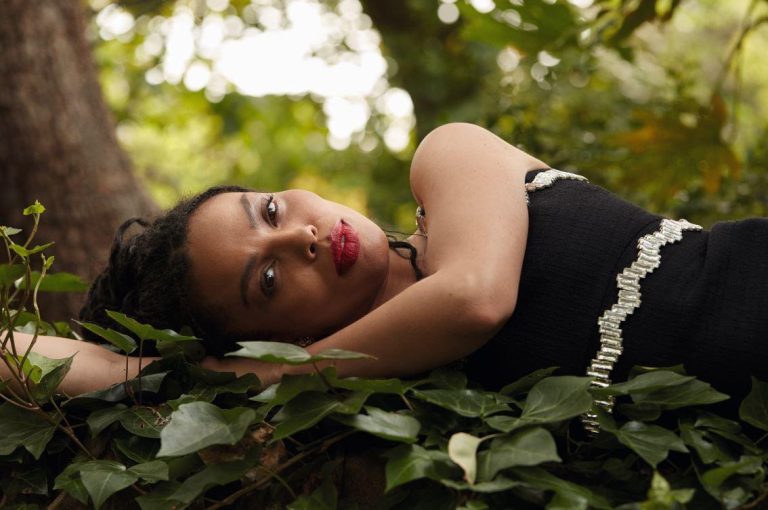
Dress PATOU.
And they're so momentary. I mean, you talk about this with Harriet Jacobs, you talk about this with Sinead O'Connor. Even the questioning of, or the things you said Megan said about her body, or Zoe¨ said about her body, the ways in which that they're navigating themselves in this way and observing themselves in this way that's so harmful. And we can see that there's so much context. With Sinead, I felt this deep sadness, and I know you did too, when she died. And this longing for justice that I feel like she received because it’s the plight of any woman, especially a woman that is seen as desirable or beautiful. I think that’s why we castigated her even more.
I'm convinced of that.
Because she can't just align herself. She can't just fall into place. She can't just be what everybody wants her to be. I've often struggled with that myself, the vulnerability that you speak of. I'm a very vulnerable person, not because I'm not strong, but because I move from my heart. It makes me be seen as weak, and think it makes me be seen as pliable.
In my own life, I’ve really mourned people not taking me more seriously or people not really wanting to hear me. I think in general, your writing about ‘pretty privilege’ moved me because yeah, as you said, it’s not something we've had a comprehensive conversation about. I think it's because women are so easily discarded in our society that we're unwilling to even humanise them or show them care. I felt this deep, deep sadness when Sinead O'Connor died, because I just felt as though she didn't receive what she deserved, and maybe none of us ever do.
She really didn’t. I feel that if somebody is perceived as possessing prettiness, but again, is not necessarily powerful in certain other ways or just has aspects of vulnerability to them, one of the reasons there's this —obviously not from everybody, but from certain quarters — there can be this desire to dominate them because if they're superior and you can dominate them, then that makes you superior to them. And I've seen that relationship play out multiple times in various contexts, but I've never really heard anyone talking about it. I really wanted to complicate our ideas of the kind of reactions and relationships [that] being seen as possessing this thing[beauty] can actually provoke, as opposed to just the received wisdom of what it gives one.
Everybody puts beauty on this pedestal and we're all sort of told to want it. If you have it or if you are being read as having it, I've felt this sort of silence of people telling me in subliminal ways that I should be quiet or I should be small, or I shouldn't have too many thoughts. I feel like the more I write, the more contentious I am, the more I disagreement I feel, and I fear that it's going to come toward me more. It's something that’s affected the way that I exist in the world. If I go out and do readings, I'm constantly aware of my surveillance and also the harm that's tied to that surveillance. So I'm grateful for you writing about it, because it’s necessary. I hope that people who are reading this conversation feel relief if they relate, because I know I did just reading that chapter then getting a chance to talk to you about it.
My second book challenged a lot of sacred cows. I was really scared, but then so many people were like, ‘oh my God, I'm so glad that you've said this’, and I actually got this huge wave of support. So, there are parts of this book that I was also scared writing about. For instance, I was like, do I write about ‘pretty privilege’? And I was like, no, I feel like this is important. I feel like this is something I'm compelled to say or compelled to talk about. So yeah, I feel like if I'm fearful of writing something, that's usually the thing that I really, really need to write about.
You’re creating a new paradigm in your writing, and I think writing that is contentious and able to make people face themselves a little bit more is the most exciting thing. So, thank you.
Make-up by Georgina Graham at Management Artist. using Chanel Holiday 2023 Make-up Collection and Chanel Sublimage la Creme. Photography assistant: Philip Banks.
DISOBEDIENT BODIES: RECLAIM YOUR UNRULY BEAUTY
Emma's work layers together history with the current. Bodies are valuable in all iterations, even when they're disobedient. So how do we come to terms with the vast inequalities that determine differences, and how do ensure those realities are protected? Here's an extract from Emma Dabiri's Disobedient Bodies.
For women, so many complicated dynamics and relationships are forged and negotiated through ‘beauty work’.
In my fond memories of getting ready with the girls, as well as in the idea of being attractive to others and experiencing desire, lie the possibilities of profound pleasure and joy, creativity, fun and excitement. These were the nights where friendships deepened, and in those hours spent together in intimate spaces before we went out, community was cultivated – who else would indulge countless outfit changes and give much-needed advice on the minutiae of whether your knee socks looked better just above or just below the knee?
While I resent my value being determined solely by the way I look, I’ve confessed my love of glamour, and there are days when attending to my body, my skin, my hair, my clothing,
wearing jewellery and luxuriating in perfumes, body oils and creams is simply what I want to do. These are all ways to connect with, care for and enjoy the experience of embodiment. Many of these practices feel intimately linked to a sense of self-care – and while this quote of Audre Lorde has been commodified almost to the point of cliché, the truth of it remains; ‘Caring for myself is not self-indulgence, it is self-preservation, and that is an act of political warfare.’
There’s an urgency to my desire for a more holistic approach. The alienation and pronounced disconnection we experience in regards to our bodies leaves us vulnerable to predatory forces that seek to manipulate us to better exploit us.
The operating logic of capitalism encourages individualism and competition, and nowhere is this more pronounced than in our beauty culture. We need to reclaim beauty and expand it beyond the boundaries of judgement and comparison that our hypervisual capitalist model encourages and uses to control us. We are under siege from a disciplinary regime that distorts what should be a source of pleasure and inspiration into something painful, punitive and exclusive. Something as ordinary as being desired has been reimagined as the preserve only of those physically perfect enough to ‘deserve’ it. For most, beauty becomes something beyond reach that can only (if ever) be accessed by submitting to regulatory procedures.
We need to come to a kinder, more expansive relationship with ourselves, each other and our bodies. More compassion directed inwards radiates outwards. This is no small feat in our often cruel, hugely competitive, image-saturated world – a fact which makes this act of reimagining all the more critical.
We are crying out for new ideas, for different ways of being, with ourselves and with each other. While there may be nothing new under the sun, there are, in the evergreen words of
Octavia Butler, ‘new suns’. The light of these other suns is hidden from us by Western discourse which positions itself as the normative centre. But by drawing on a range of sources, stories and histories from different places and times, I seek the light of these other suns to help illuminate the pathway from pain to pleasure.
Disobedient Bodies: Reclaim Your Unruly Beauty
by Emma Dabiri is published on 5th October 2023 by Profile Books X Wellcome Collection, priced £7.99 in paperback original. The Cult of Beauty, a major accompanying exhibition at the Wellcome Collection, is open from 26 October 2023 – 28 April 2024.
Related Articles

Liberty 150 x150 curated by Leith Clark: The Founder Interviews

Liberty 150 x150 curated by Leith Clark: The Founder Interviews

Liberty 150 x150 curated by Leith Clark: The Founder Interviews

Liberty 150 x150 curated by Leith Clark: The Founder Interviews
